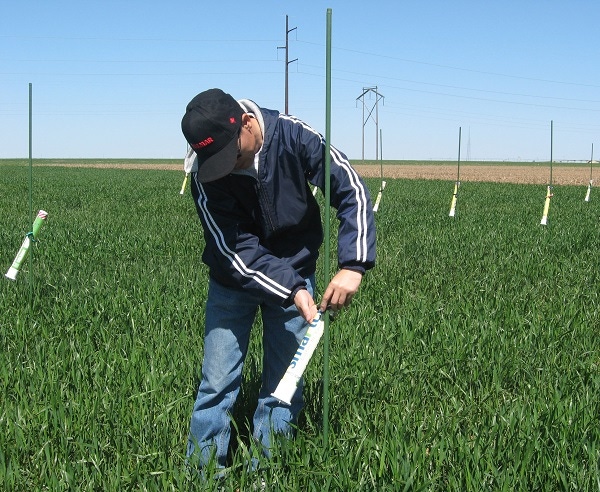September 18, 2014

Although wheat yield and drought tolerance have been improved over the years by the Texas A&M Wheat Breeding Program, the physiological mechanisms of drought tolerance among the TAM wheat cultivars have not been well understood, according to Texas A&M AgriLife Research scientists in Amarillo.
Three different AgriLife Research studies in Amarillo have been aimed at determining what traits within the TAM cultivars provide greater or less drought tolerance. The results have recently been published in three international journals.
“Physiology and Transcriptomics of Water-deficit Stress Responses in Wheat Cultivars TAM 111 and TAM 112” was published in Journal of Plant Physiology; “Cooler Canopy Contributes to Higher Yield and Drought Tolerance in New Wheat Cultivars” appeared in Crop Science; and “Effective Use of Soil Water Contributed to High Yield in Wheat in the U.S. Southern High Plains” appeared in the Journal of Arid Land Studies.
Leading the AgriLife Research efforts from Amarillo are Dr. Qingwu Xue, crop stress physiologist; Dr. Shuyu Liu, small grains geneticist; Dr. Jackie Rudd, wheat breeder; Dr. Srirama Krishna Reddy, assistant research scientist; and Dr. Gautam Pradhan, a former postdoctoral scientist with AgriLife Research and now a North Dakota State University research agronomist.
Additionally, Dr. Scott Finlayson, AgriLife Research molecular physiologist at College Station, and Dr. Paxton Payton and Dr. James Mahan, plant physiologists at the U.S. Department of Agriculture-Agricultural Research Service in Lubbock, were a part of the projects. These studies were funded in part by Texas Wheat Producers Board, AgriLife Research and the USDA Ogallala Aquifer Program.
Rudd said it is not unusual for hard red winter wheat crops to experience moderate to severe drought stress, especially during the grain filling stage, resulting in significant yield losses.
Read more on wheat drought research.
You May Also Like




